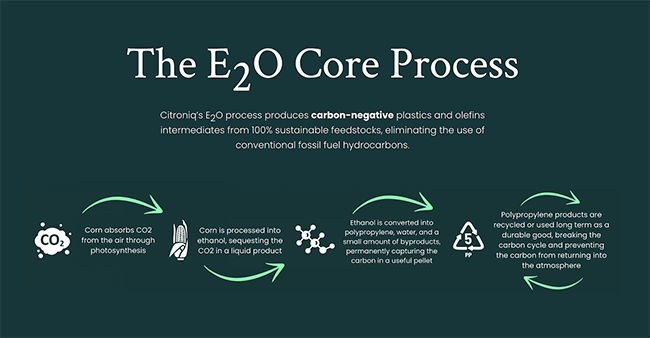Following Braskem’s announcement of potential production of carbon-negative bio-based polypropylene (PP) in the United States, start-up Citroniq also has major plans to produce PP based on bio-ethanol in Kansas.
February 21, 2023

Bio-ethanol is already extensively used as a fuel for motor vehicles in the United States, which is the world’s largest producer ahead of Brazil. But with greater market penetration of electric vehicles (EVs) coupled with fewer young people getting their driver’s license — once considered a rite of passage to independence and adulthood — and increasing levels of shared transportation potentially denting long-term demand for fuel, corn-based bio-ethanol producers would welcome alternative outlets for their product.
One potential avenue that is emerging is the conversion of bio-ethanol into bio-propylene for the polymerization of bio-polypropylene (PP). Interestingly, this bio-PP could also eventually find its way into cars, functioning as a long-term carbon sink in components such as bumpers, instrument panels, and other interior and exterior parts. In fact, bio-PP is a drop-in replacement for all manner of durable and disposable applications where conventional PP is currently used.
While European PP suppliers, joined by one Japanese supplier, have been the first to recognize the future potential of bio-PP in applications from packaging to pipe and kicked off application development, the ready availability of bio-ethanol in the Midwest has ignited interest in projects for bio-PP production there. First off the mark was the world’s leading bio-polyethylene player Braskem, announcing that it was considering producing carbon-negative bio-based PP in the United States. Shortly after, Houston-headquartered start-up Citroniq Chemicals announced the signing of a letter of intent with Mitsui Plastics Inc. (MPI), a wholly owned subsidiary of trading house Mitsui & Co. (USA) Inc., for a large-scale supply agreement for sustainable PP, marking the beginning of a long-term alliance between the two companies.
Citroniq plans to construct a bio-based PP plant in Kansas, with annual capacity pegged at 450,000 tonnes/year, which is 20 times more than current global green polypropylene production, according to the company. Citroniq says it will make sufficient quantities of bio-PP to keep costs low and allow compounders and molders to run dedicated product lines.
|
"Citroniq is dedicated to being a 'pure play' sustainable materials company. With our annual capacity of over 800 million pounds of green polypropylene at our Kansas plant, our cost position will be highly competitive, leveraging existing feedstocks and logistically advantaged infrastructure," said Citroniq co-founder Kelly Knopp.
"Together, MPI and Citroniq will be able to provide customers with global-scale supplies of 'drop-in' sustainable resins much faster than the alternatives, resulting in meaningful reductions in their carbon footprint, on schedule with their carbon reduction targets," added Citroniq co-founder Mel Badheka.
The Citroniq plant will be powered primarily by renewable energy, while the dehydrogenation step employed in the company’s E2O process will be a net contributor to water resources in Kansas.
About the Author(s)
You May Also Like





